|
Involvement in Haiti
Doug
Stein, MD
In December 2009,
an article published in Florida Medical Business (See the article
here and forward to page 8) caught the eye of Ted Kaplan, MD, a
pediatrician in Orlando with a special interest in Haiti. He thought that
my efforts at preventing unintended pregnancy through vasectomy in
Florida, India, and the Philippines would be very valuable in Haiti. His
wife's cousin,
Fritz Lolagne,
MD, (click for his fascinating bio) is a Haitian doctor who
performs tubal ligations and traditional vasectomies at multiple sites
throughout Haiti. When Ted read about the no-needle no-scalpel method, he
felt that it would be of great interest to Dr. Lolagne in his mission to
make vasectomy more acceptable to Haitian men. Ted attended my vasectomy
clinic in Kissimmee on January 7, 2010, his eagerness for me to provide
vasectomy training in Haiti grew, and arrangements were made for Dr.
Lolagne to visit my Tampa office during his next trip to the US in April
to visit his family in Orlando.
|
| Five days later, a 7.0
magnitude earthquake rocked much of the most densely populated areas
of Haiti and Dr. Lolagne's home in Petit Goave, just west of
Port-au-Prince, was destroyed while he was away providing tubals and
vasectomies in northern Haiti. Undaunted, Dr. Lolagne continued with
his work and came to the US as planned in early April. |
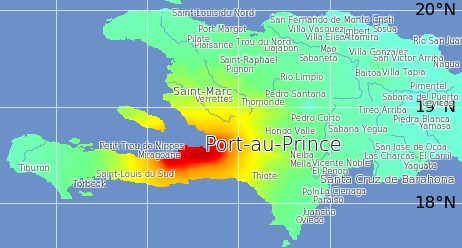 |
|
|
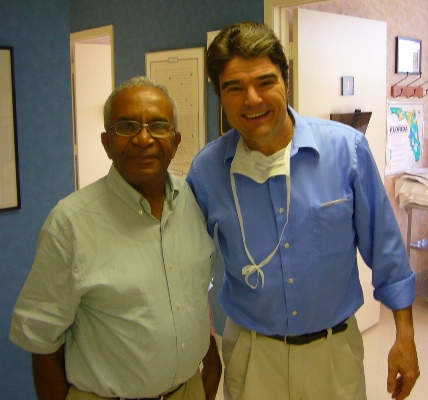 |
Dr. Lolagne and I shared
ideas when he came to my office on April 1. He was very impressed
with the simplicity and speed of the no-needle no-scalpel technique
and began to make plans for me to come to Haiti to help him
determine which health care sites would be the most acceptable for
providing vasectomy services.
Much of Dr. Lolagne's work is funded by
MSH,
a nonprofit international health organization
composed of more than 2,000 people from 73 nations
whose mission is to save lives and improve the health of the
world's poorest and most vulnerable people by closing the gap
between knowledge and action in public health.
But Dr. Lolagne provides most of his tubal and vasectomy services
for no compensation at all. |
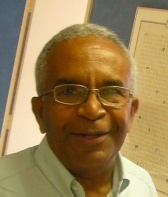 |
|
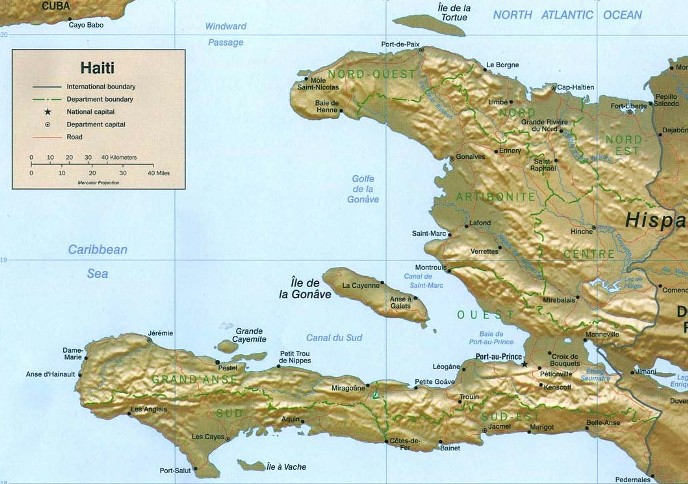 |
|
Haiti's population of about
10,000,000 occupies a largely mountainous area the size of the State of
Maryland, so it is one of the most densely populated countries on Earth.
Even before the earthquake of January 12, 2010, Haiti was a country of
extreme poverty and deprivation. Many of its natural resources, including
its once-rich forests, have been depleted. Government corruption, crime,
illiteracy, and disease are all too prevalent. It lies in the path of
devastating hurricanes with the potential to turn its treeless hillsides
into torrents of mud. Yet, while the infrastructure remains frail, the
population continues to explode because of inadequate access to safe
family planning. |
|
Tubal ligations are most safely
performed in formal operating room settings. While general anesthesia is
too expensive, local anesthesia is used, but the procedures are still
quite painful even when performed by the most experienced surgeons, and
there are not enough tubal surgeons to meet the needs of the population.
Vasectomies can be quickly done in simpler settings, and they are almost
always painless when properly performed. So Dr. Lolagne wants to train
doctors to perform vasectomies as well as tubals. And he wants me to help
him because he feels that Haitian doctors will respond very positively to
an American surgeon. |
|
|
|
In late April, I visited Haiti for
the first time, to determine, with Dr. Lolagne, which locations might be
best for providing vasectomy services. Our decisions would be based upon
the local facilities and the interest and support of local health care
providers. We visited six potential sites. |
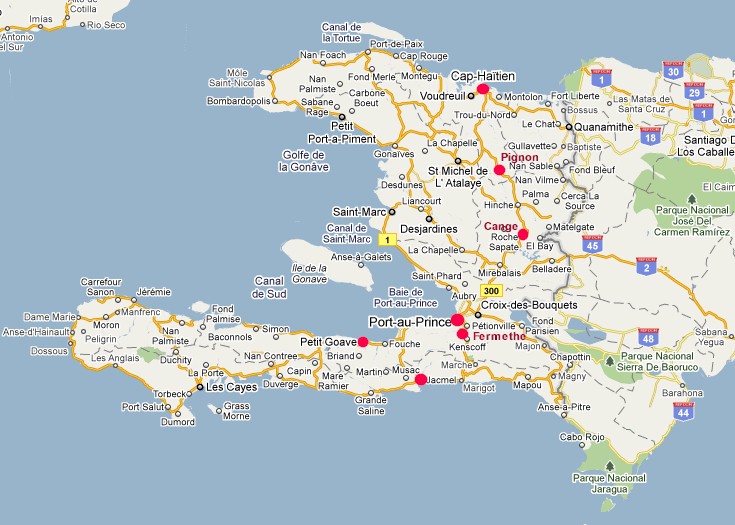 |
| Tuesday, April 27: First we visited with
important health care officials in Port-au-Prince.
Dr. Gadner Michaud
(left in photo) is the Executive Director of Profamil
(the international arm of Planned Parenthood) in Haiti.
Dr. Andre Paul Carrenard,
MD, MPH (right in photo) is the Executive Director of the Haitien
Institute of Community Health (INHSAC; Institut Haitien de
Sante Communautaire) and the former Director of Profamil. |
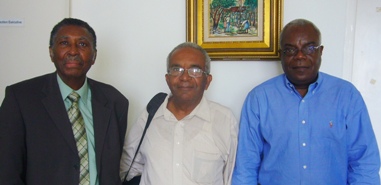 |
|
|
Toward evening, we drove north along
the coast toward Saint Marc and stopped at Club Indigo
where we attended a meeting of
MSH
(Management Sciences for Health)health care
representatives from the 10 departments. |
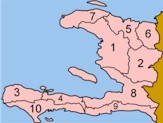 |
|
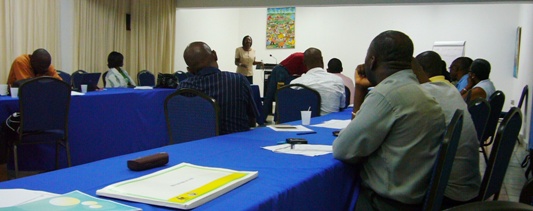 |
|
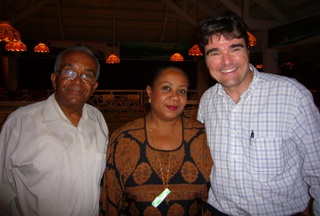 |
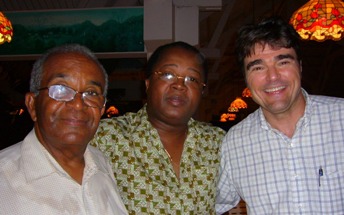 |
| I had the
privilege of meeting Florence Guillaume, MD, MPH, a Family
Physician and the second highest-ranking official of
MSH in Haiti ... |
... and Dr.
Lucito Jeannis, an obstetrician/gynecologist who is the
Country Director for
JHPIEGO
(Johns Hopkins Program for International Education in Gynecology &
Obstetrics). |
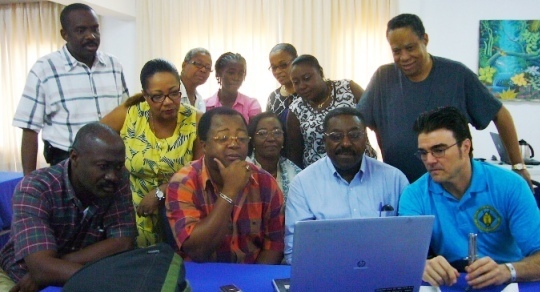 |
|
Dr. Lolagne and I returned to the week-long
meeting a few days later and were given the opportunity to show a
video of the NNNSV (No-Needle No-Scalpel Vasectomy). Dr. Jean Bernard
Fevrier (seated at left), an OB/GYN who has recently transferred
from JHPIEGO to MSH,
works in PAP as a trainer of postpartum care and
travels throughout Haiti with Dr. Lolagne to perform tubal
ligations. Dr. Georges Dubuche (OB/GYN), in the light blue
shirt, is in charge of matching funds for MSH. |
|
| Wednesday, April 28:
We wakened early to drive to Fermathe where Dr. Lolagne was
scheduled to perform tubal ligations at Baptist Hospital of Fermathe. But before
leaving, I had an opportunity to meet Dr. Calerbe St. Louis,
an OB/GYN who is the Departmental Technical Advisor for Les Nippes
(one of the 10 departments). |
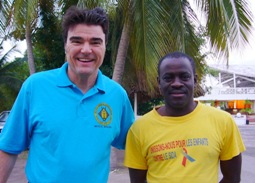 |
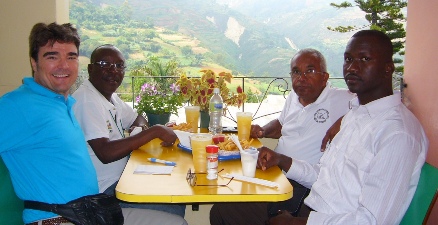 |
On arrival in
Fermathe, we
enjoy a nice lunch overlooking the Haitian hills with our driver
Jean Robert Charles and Dr. Obelson Revolus, a second-year
resident in OB/GYN at University Hospital
in Port-au-Prince. |
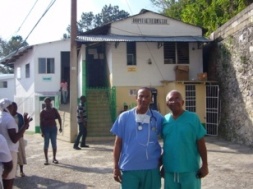 |
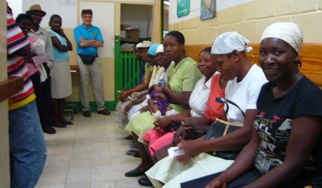 |
|
At H�pital Baptiste Fermathe, the
patients were waiting. It was a successful day for tubals, but no
interest in vasectomy. |
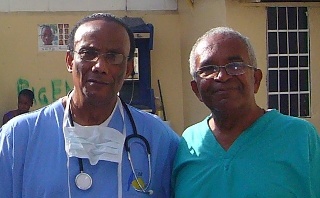 |
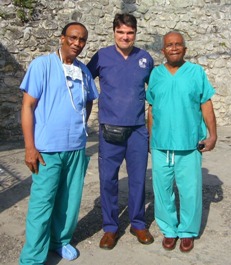 |
|
General Surgeon Dr. Claude Bernard is
the Director of Baptist Hospital Fermathe who, along with
Administrator Jean Angus, graciously offered their
facility as a vasectomy center in Haiti. |
|
| Thursday, April 29: We
left Fermathe very early in order to pick up Lisette (Dr. Lolagne's
invaluable assistant) in PAP and get to Cap Haitien on the northern
coast of Haiti before nightfall. We would have to go most of the way
on Route 3, the main connecting road between the two biggest cities
in Haiti (PAP and Cap Haitien) and most of Route 3 is not paved.
|
| About 1/3 of the way
to Cap Haitien, at the town Cange within the central highlands of Haiti is Zanmi
Lasante, one of the finest medical facilities in Haiti thanks
to the vision and tireless efforts of Bishop Fritz Lafontant
and Dr. Paul Farmer, the founder of
Partners in
Health. |
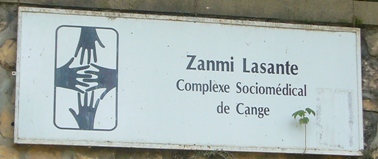 |
|
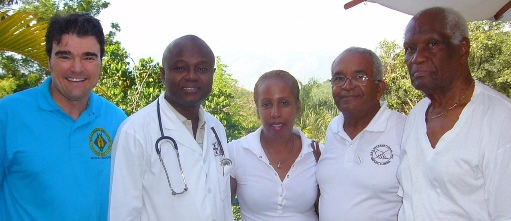 |
|
Here
are Dr. Lolagne and myself with Joanel Joasil, MD,
Medical Director of Zanmi Lasante, Marie Flores Chipps,
Coordinator of Activities at Zanmi Lasante, and Bishop
Fritz Lafontant, Director General of Zanmi Lasante. |
|
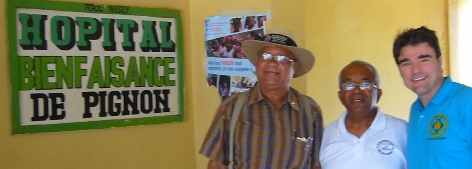 |
Further north in the
remote city of Pignon, we were hosted by Dr. Guy Theodore, a
Fellow of the American College of Surgeons, District Governor,
and Director of the Hopital Bienfaisance de Pignon. |
|
| In
Cap Haitien, we
explained our goals to Dr. Ernst Robert Jasmin, Medical
Director of the Northern Department ... |
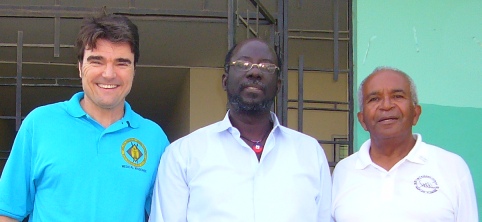 |
|
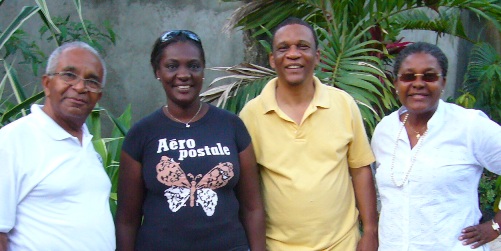 |
... and met with Dr.
Guy Dugue, a General Practitioner with excellent surgical
skills and owner of the Dugue Clinic of Medicine and Surgery
(Clinic Medico Chirurgicale Dugue)
just outside Cap Haitien on National Road #1. Dr. Dugue
graciously offered his clinic as a site for vasectomy services
and training.
Pictured are Dr. Lolagne, his assistant
Lisette, Dr. Dugue, and Dr. Dugue's wife. |
|
|
|
After a hearty dinner in Cap Haitien,
we made a nighttime journey all the way back to Club Indigo where we met
again with the doctors of MSH and JHPIEGO on Friday April 30. We
then went on to
Petit Goave, where Dr. Lolagne's home was destroyed by the earthquake while he
was fortunately performing tubal ligations in the far north out of harm's
way. Then we went to Jacmel on the south coast to check a potential
vasectomy site there.
On Saturday May 1, I returned to the USA while Dr. Lolagne
remained to carry on his mission and make arrangements for my second trip
to Haiti to begin the process of training Haitian doctors to perform NSV
at the sites most conducive to this new service. |
| On August 30,
2010, Dr. Ramon Suarez,
urologist, NSV specialist, and President of No-Scalpel Vasectomy
International (NSVI), joined me for my second trip to Haiti, this time to
(1) perform vasectomies in Cange (Zanmi Lasante), Ouanamithe,
Cap Haitien,
and Fermathe, and (2) train doctors at these locations to perform NSV
themselves and thereby offer the service year-round to men who wish to
play a stronger role in family planning. |
Third trip to Haiti: May/June 2011
|
|





















